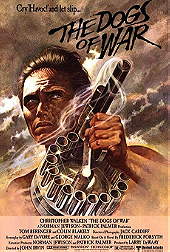Fundamentally equal parts Apocalypse Now, The Passenger and any commando movie ever made, The Dogs of War is an examination of the morals of life as a hired killer. Although released during the '80s (the heyday of rock 'em sock 'em action flicks) this is no twin brother to such gloriously violent actioners as Commando. Instead, the film - based on the best-selling novel by Frederick Forsyth - is a thoughtful war drama; demonstrating the kind of intelligence which is rare in movies aimed at the regular action-adventure crowd. While action and gunplay features in both the beginning and the climax, The Dogs of War is for the most part concerned with dramatic growth and story. With that said, however, a sluggish pace renders the film at times enjoyable but at other times a chore to get through.

In the film, Christopher Walken plays a mercenary for hire named John Shannon. Not long into the film, Shannon is assigned a mission of reconnaissance - to travel to the tiny African dictatorship of Zangara to evaluate whether the government can be easily overthrown. Utilising the smokescreen of a bird photographer, Shannon heads to Zangara to gather the necessary information, but unfortunately suffers terrible torture from the African guards who are suspicious of his purpose. Following his eventual deportation from the nation, Shannon begins assembling a team of elite mercenaries to return to Zangara to perform a coup d'état and remove the dictator from power. However, while carrying out the dangerous mission, Shannon starts having severe doubts about the ethical nature of the assignment.
The title of The Dogs of War is derived from a phrase used in William Shakespeare's play Julius Caesar - "Cry, 'Havoc!', and let slip the dogs of war". Suitably, this quote prefaces the film.

Speaking from a narrative standpoint, The Dogs of War is a pretty standard fare (unsurprisingly). In particular, Shannon's initial surveillance is conventional stuff - he meets a nosy Englishman who's fed up with local politics preventing him from filming a documentary, he encounters a local security chief who takes an interest in Shannon, there's an enigmatic woman who acts as Shannon's guide, and there's the obligatory arrest. For the original two-hour cut (the cut being assessed in this review), the interlude between Shannon's surveillance and the final assault is too lengthy - it becomes bogged down by a subplot concerning Shannon's relationship with his ex-wife. This is a standard, clichéd distraction which was included to afford Shannon's character a degree of depth, yet it's rather superfluous and leads nowhere. The subplot is murder to the pace, and is without a payoff.
Retaining the extraordinary detail present in Frederick Forsyth's novel, The Dogs of War provides an exhaustive examination of all the intricate ins & outs of what it takes to remove a dictator from power. It covers the logistical problems of recruiting a team of mercenaries, crossing borders, obtaining money and weapons, and making sure all of these things are in the target country at the right time. The Dogs of War is basically Staging a Military Coup for Dummies. On the other hand, all this incredible detail does not mean the film is necessarily entertaining. John Irvin's direction is meticulous to a fault; to the extent that he neglected to consider pacing. The majority of the movie is devoted to the endless preparation preceding the rather short assault. As a result, The Dogs of War is short in the machismo department, and - for a war movie - there is just not enough war. Thankfully, the battle sequences which bookend the film are well-staged, and the cinematography by Jack Cardiff is consistently solid. The action does not quite compensate for the sluggish middle section, but it's a step in the right direction (the opening is particularly outstanding).

In terms of acting, there's not a lot to complain about, though some of the supporting cast are a tad forgettable. In the role of Shannon, Christopher Walken is strong and convincing. Walken exudes cool here, and his acting is fantastic as well. The actor usually affords something out of the ordinary to his performances, and The Dogs of War is no different. In particular, Walken excels at conveying the sense that he's not completely there - that a part of him is spectating, and he's not entirely wrapped up in the actions of the moment. This attribute suits Shannon's jaundiced view of the operation, and as a result Shannon's behaviour at the film's end is believable. Great support was provided by Tom Berenger as a fellow mercenary, as well as from Colin Blakely as the English filmmaker who pops in and out of the story to no great effect. Other supporting roles were filled by competent actors who fail to stand out, most notably JoBeth Williams as Shannon's ex-wife.
The Dogs of War was not a breakout success due to its realism - there are no action-adventure movie clichés, hyped melodrama, large-scale action sequences, or much excitement. At the end of the day it's a decent motion picture which has its moments, but it's not a film to watch repeatedly due to its meandering nature.
6.2/10
 Login
Login